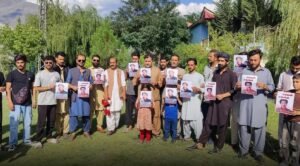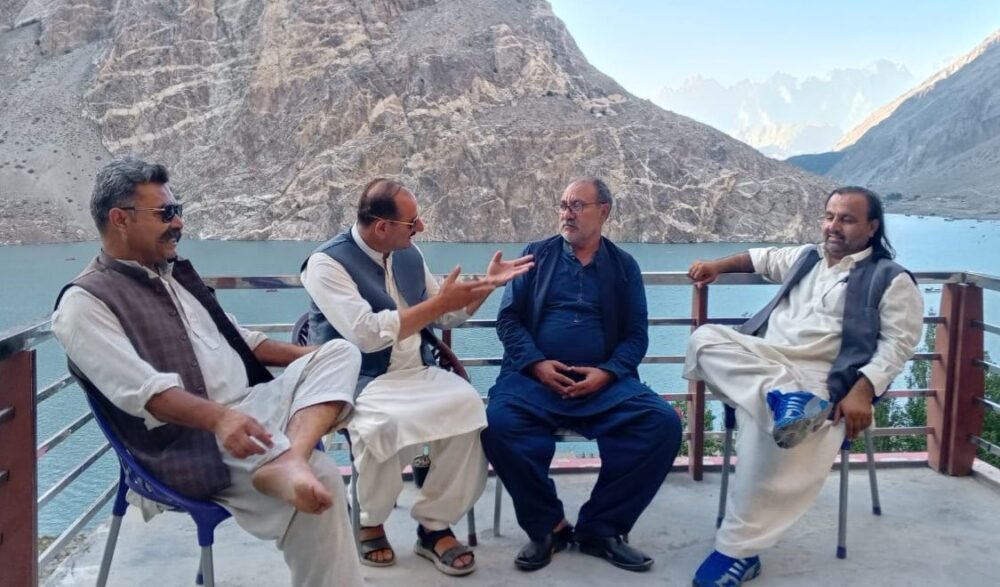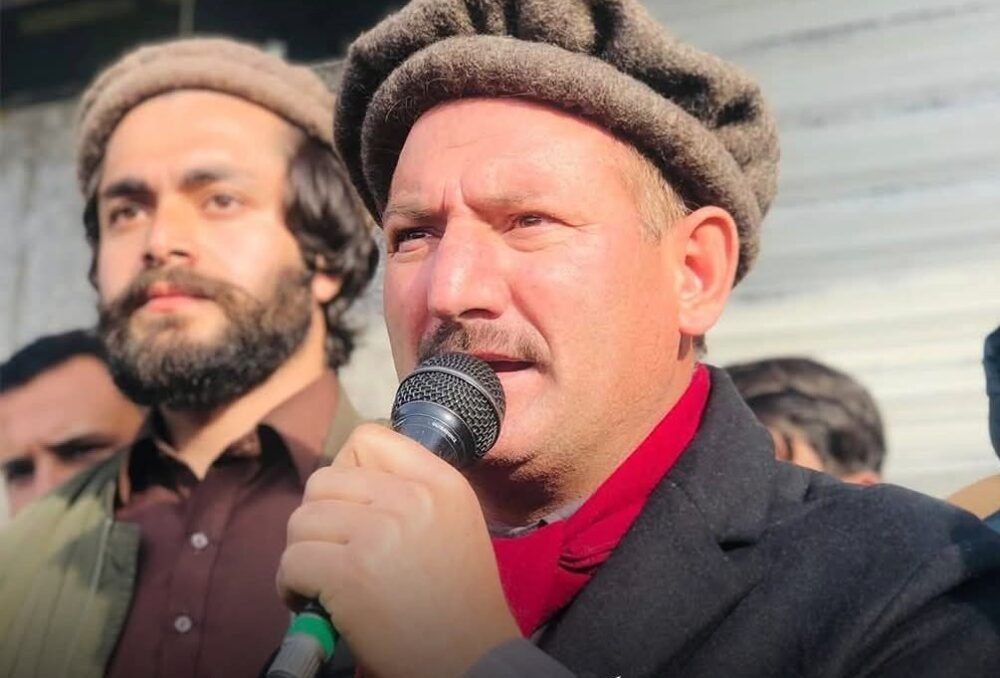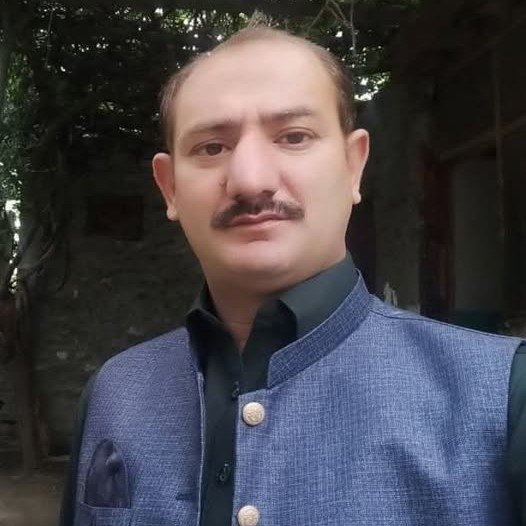by F.Ali & Nadeem Aman
The political landscape of Gilgit-Baltistan was jolted last week by the brazen daylight assassination of Javed Qureshi—widely known as Numberdar Javed Naji—a rising political and resistance figure from Diamer Division and a fearless voice for the region’s disenfranchised.
On July 31, Naji was gunned down in Tangir Valley’s Darkali area, alongside a woman identified as Chaman, with his wife critically injured in the attack. His children and mother reportedly survived the shooting. The assailants, named in police reports as Afsar Khan and Dar Khan, allegedly opened fire while Naji and his family were at a riverside location. The Jaglot police have registered an FIR on the complaint of Ameer Hamza, Naji’s father under sections 302, 311, 324, and 337(F) of the Pakistan Penal Code at Jaglot Police Station.
This is the second reported “honour killing” in Tangir within a week. Yet, many believe the narrative is a smokescreen to conceal a politically motivated assassination designed to silence dissent in one of Gilgit-Baltistan’s most strategically sensitive regions.
A silenced voice, a rising movement
Political parties, legal experts and human rights activists have widely rejected the honour-killing narrative. Leaders from the Awami Action Committee (AAC), Awami Workers Party (AWP-GB), Karakoram National Movement, Karakoram Students Organisation, All Baltistan Movement, and National Workers Front condemned the murder as a premeditated political assassination—a method increasingly used to neutralise voices of resistance under the guise of cultural violence.
Javed Naji was more than a political worker; he was a movement. And they killed him for that
AAC-GB Spokesperson
At a protest rally held in Gilgit on August 1, civil society leaders and political activists declared that Javed Naji’s murder was part of a broader pattern of suppressing resistance against exploitation and state repression.
“Javed Naji was more than a political worker; he was a movement. And they killed him for that,” said an AAC spokesperson.



“We are witnessing a systematic effort to silence those who oppose the looting of our lands, the marginalisation of our people, and the erosion of our identity.”
The protest ended with a collective vow to continue Naji’s mission: struggle for land rights, regional autonomy, and safeguarding natural resources.
Protesters called for a judicial inquiry into the assassination and rejected any cosmetic investigation.
“The killers, their enablers, and the masterminds must all be exposed,” an AAC leader asserted. “If justice is denied, we will launch a region-wide resistance movement.”
The murder of Naji, a secular and nationalist leader, has also laid bare the increasing danger faced by those advocating autonomy, local governance, and resource control in Gilgit-Baltistan. Notably, AAC Chairperson Ehsan Ali Advocate and 14 other senior leaders were recently detained under Pakistan’s anti-terror laws before being released due to public pressure.
The AWP-GB called the killing “a calculated execution” and demanded an independent investigation, warning that cultural pretexts are being weaponised to eliminate dissidents.
“This so-called honour killing is an insult to Javed’s legacy,” read the AWP-GB statement. “He opposed sectarianism, tribalism, and feudal domination. That’s why he was targeted.”
The Karakoram National Movement, KSO, and National Workers Front declared three days of mourning, calling the incident a “national tragedy” and denouncing the murder as part of a systematic agenda to pillage the region’s lands and resources under the guise of development.
“Javed Numberdar was not just a man—he was a symbol of resistance,” their statement said. “His blood is not spilled in vain; it is a call to deepen our struggle.”
Javed Naji’s political journey was marked by an unwavering commitment to peaceful resistance. A rare secular nationalist voice in Tangir, a region steeped in tribal and conservative traditions, he challenged both reactionary local forces and state-backed repression. His placement on the Fourth Schedule of the Anti-Terrorism Act before his death is widely seen as a state attempt to isolate and surveil him.
He was a fierce critic of mega-projects like Diamer-Bhasha Dam, which have displaced locals and stripped them of land and compensation. He also opposed unregulated mining and the militarisation of local governance, earning him enemies among both state and non-state actors.
“This was not just a crime—it was a public execution. And the state must be held accountable”
HRCP
The Human Rights Commission of Pakistan (HRCP) condemned the killing as “barbaric” and demanded urgent reforms to dismantle the impunity surrounding honour-based violence and political suppression.
“This was not just a crime—it was a public execution. And the state must be held accountable,” the HRCP said, adding that the region’s lack of specific legal frameworks against honour killings further fuels impunity.
Political murders in GB are often disguised as family feuds or honour killings. In reality, even relatives are sometimes co-opted by powerful interests to carry out these assassinations.”
Asif Naji, lawyer
Baltistan-based lawyer Asif Naji echoed this sentiment, stating: “Political murders in GB are often disguised as family feuds or honour killings. In reality, even relatives are sometimes co-opted by powerful interests to carry out these assassinations.”
Rights groups, legal experts, and activists have demanded a judicial inquiry under the Gilgit-Baltistan Chief Court or an independent commission, criminal prosecution of the perpetrators and any facilitators, legal reforms treating honour killings as aggravated murders without provision for compromise, abolition of the Fourth Schedule’s misuse against political activists, protective measures for women and political workers at risk.
“We’re told this was about honour,” said a protester. “But honour lies in justice, not in silencing the truth.”
Javed Numberdar’s legacy is now etched into the memory of a region long denied basic rights. His assassination has become a rallying cry for those demanding justice, autonomy, and dignity in Gilgit-Baltistan.
The question now is whether his death will usher in a new wave of resistance — or mark yet another chapter in the silencing of voices that dared to speak up.

The High Asia Herald is a member of High Asia Media Group — a window to High Asia and Central Asia

